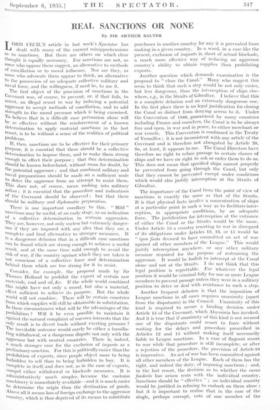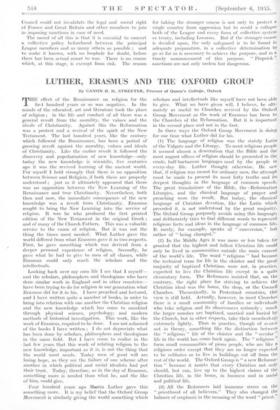REAL SANCTIONS OR NONE
By SIR ARTHUR SALTER
LORD CECIL'S article in last week's Spectator has dealt with many of the current misapprehensions as . to sanctions. But there are others on which clear thought is equally necessary. For sanctions are not, as some who oppose them suggest, an alternative to methods of conciliation or to moral influence. Nor are they, as some who advocate them appear to think, an alternative to the possession of an adequate collective military and naval force, and the willingness, if. need be, to use it. The first object of the provision of sanctions in the Covenant was, of course, to prevent, or, if that fails, to arrest, an illegal resort to war by inducing a potential aggressor to accept methods of conciliation, and to add strength to the moral pressure which is being exercised. To believe that in a difficult case persuasion alone will be as effective without the reinforcement of a known determination to apply material sanctions in the last resort, is to be without a sense of the realities of political problems. If, then, sanctions are to be effective for their primary Purpose, it is essential that there should be a collective determination to impose them, and to make them strong enough to effect their purpose ; that this determination Should be known beforehand, without room for doubt, by the potential aggressor.; and that combined military and naval preparations should be made on a sufficient scale to deter the aggressor from an attempt to resist them. This does not, of course, mean rushing into military action ; it is essential that the procedure and: indications of the Covenant should be. observed ; but that there should be military and diplomatic preparation; There is one important corollary to this, " Mild " sanctions may be useful, at an early stage, as an indication " a collective determination to restrain aggression. They are, however, not only useless but extremely danger- ous if they are imposed with any idea that they are a .complete and final alternative to stronger measures. It is a dangerous delusion that in a difficult ease sanctions can be found which are strong enough to achieve a useful result, and at the same time mild enough to avoid the risk of war, if the country against which they are taken is not conscious of a collective force and determination 'behind them which are too strong for it to resist.
Consider, for example, the proposal made by Sir Thomas Holland to prohibit the export of certain raw materials, coal and oil, &c. If the whole world combined this might have not only a moral, but also a material, effect sufficient to achieve its purpose. But the whole World will not combine. There will be certain countries from which supplies will still be obtainable in substitution. In these circumstances what will be the advantages of the prohibition ? Will it be even possible to maintain it against the natural complaint of our own interests that the Only result is to divert trade without exerting pressure? The inevitable outcome would surely be either a humilia- ting withdrawal, or a dangerous dispute not only with the aggressor bat with neutral countries. There is, indeed, a much stronger case for the exclusion of imports as a Preliminary sanction. For this is politically easier than the prohibition of exports, since people object more to being forbidden' to sell than to being forbidden to buy. It is : complete in itself, and does not, as in the case of exports, comPel either withdrawal or bloCkade measures. It is administratively much simpler, . because the customs inachinery is immediately available—and it is much easier to determine the origin than the destination of goods. Above all it means loss of foreign exchange to the aggressor Country, which is thus deprived of its means to substitute purchases in another country for any it is prevented from making in a given country. In a word, in a case like the • present, exclusion of imports is, short of actual blockade,. a. much more effective way of reducing an aggressor country's ability to obtain supplies than prohibiting exports. Another question. which demands examination is the proposal to " close the Canal." Many who suggest this seem to think that such a step would be not only easier, but less dangerous, than the interception of ships else- where, e.g., in the Straits of Gibraltar. I believe that this is a complete delusion and an extremely dangerous one. In the first place there is no legal justification for.closing the Canal as distinct from denying access to it. Under the Convention of 1888, guaranteed Aiy many countries including France and ourselves, the Canal is to be:always free and open, in war and in peace, to either merchant or war vessels. This ,Convention is confirmed in the Treaty of Versailles ; it is not inconsistent with any article of the Covenant and is therefore not abrogated by Article 20. So, at least, it appears to me. ' The Canal Directors have therefore no right to refuse passage to certain classes of ships and we have no right to ask or order them to do so: This does not mean that specified ships cannot -properly. be prevented from going through the Canal, but only that they cannot be prevented except under conditions which would also justify interception at the Straits of Gibraltar.
The importance of the Canal from the point of view of sanctions is exactly the same as that of the Straits. It is that physical facts involve a concentration of ships at a particular point in such a way as to facilitate inter, ception, in appropriate conditions, by an adequate force. The justification for interception at the entrance of either the Canal or the Straits would be the same. Under Article 16 a country resorting to war in disregard of its obligations under Articles 12, 13, or 15 would be "ipso facto deemed to have committed an act of war against all other members of the League." This would justify interception anywhere, or any other military measure required for the purpose of restraining the aggressor. It would be foolish to intercept at the Canal alone and not at the Straits. I do not think that this legal position 'is regrettable. For whatever the legal inalufloillelyssftohreoynwe eolreminoraemLieliatrrye position it would be criminal 'members to prevent passage position to deter or deal with resistance to such a step. Another frequent delusion is that the imposition of League sanctions in all eases requires unanimity (apart from the disputants) in the Council. Unanimity of this kind is required to secure a binding decision under Article 15 of the Covenant, which Abyssinia has invoked. And it is true that if unanimity of this kind is not secured one of the disputants could resort to force without waiting for the delays and procedure prescribed in Articles 12 and 15 without making itself necessarily liable to League sanctions. In a ease of flagrant resort to war while that procedure is still incomplete, or after a rejection of the procedure, the provision of Article 16 is imperative. An act of war has been committed against all other members of the League. Each of them has the of imposing sanctions ; and, right, and indeed the duty, in the last resort, the decision as to whether the casus foederis has :arisen rests with the individual country. Sanctions should be " effective " ; an individual country would be justified in:Tefusing to embark on them alone ; but it is important to realise that in the ease of the single, perhaps corrupt,: vote of one member of the Council could not invalidate the legal and moral right of France and Great Britain and other members to join in imposing sanctions in case Of need.
The moral of all this is that it is essential to concert a collective policy beforehand between the principal League members and as many others as possible ; and to make it known, with no loophole for doubt, before there has been actual resort to war. There is no course which, at this stage, is exempt from risk. The reason for taking the stronger course is not only to protect a single country from aggression but to avoid a collapse both of the League and every form of collective system or treaty, including Loearno. But if the stronger course is decided upon, the only safeguard is to be found in adequate preparation, in a collective determination to go as far as is necessary to achieve the purpose, and in a timely announcement of this purpose. " Pinprick sanctions are not only useless but dangerous.







































 Previous page
Previous page